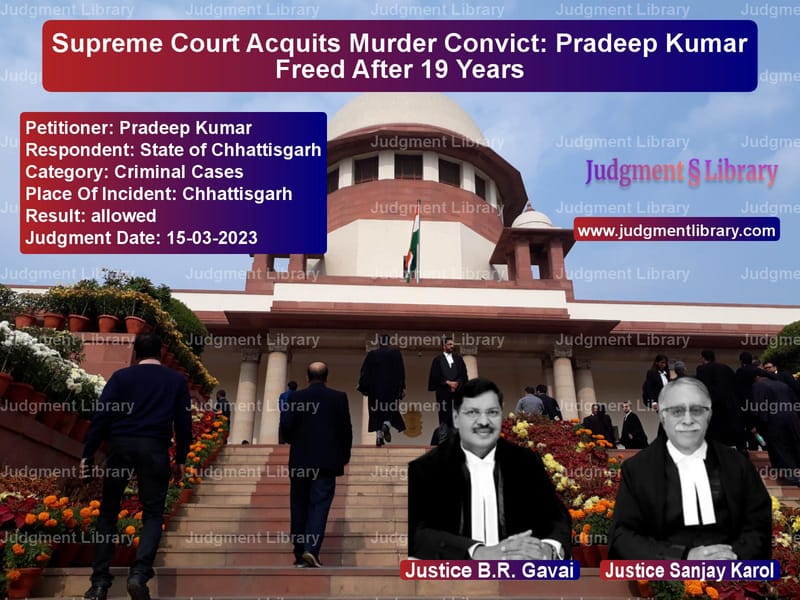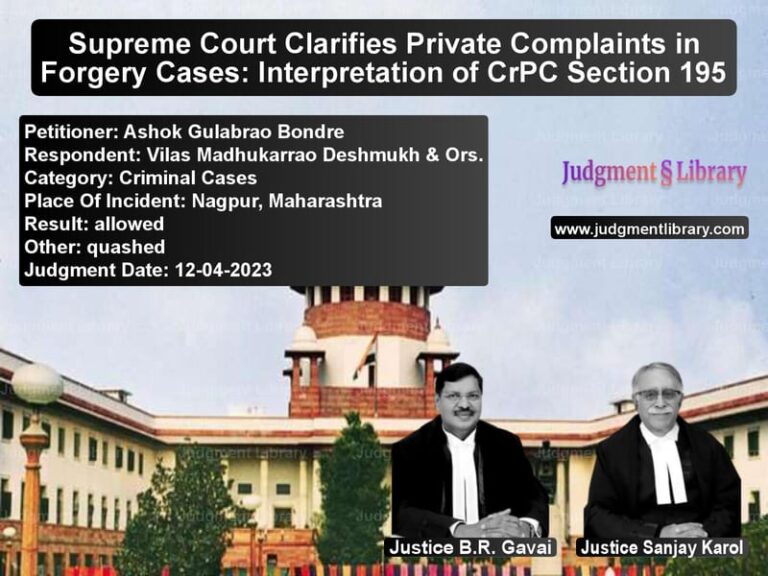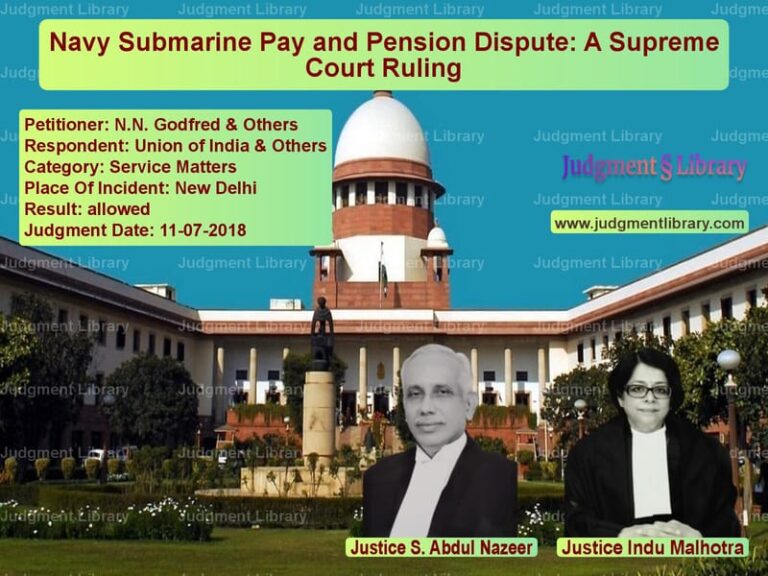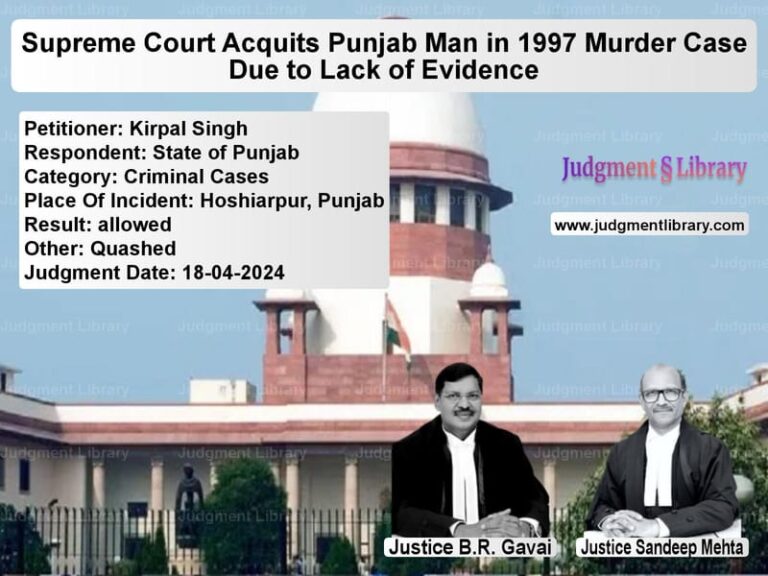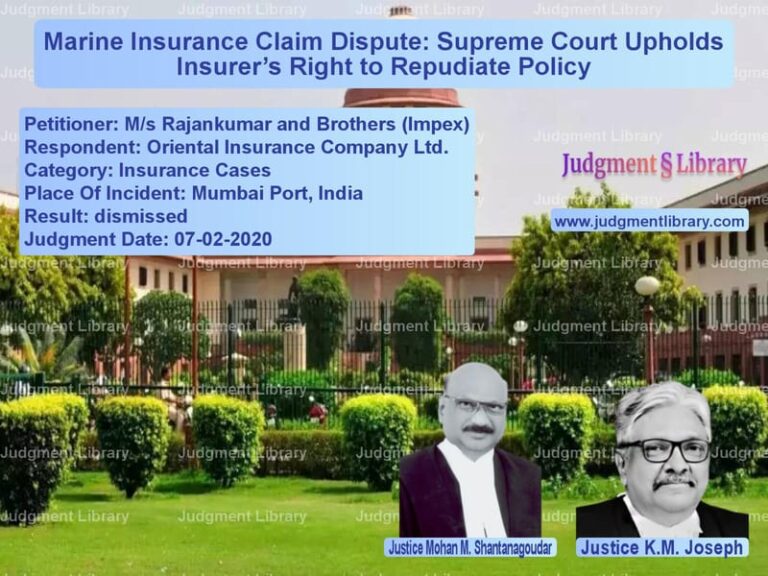Supreme Court Acquits Murder Convict: Pradeep Kumar Freed After 19 Years
The Supreme Court of India has acquitted Pradeep Kumar, who was convicted for the murder of Umesh Chowdhary in 2003. The judgment in Pradeep Kumar v. State of Chhattisgarh overturned the findings of the Trial Court and the Chhattisgarh High Court, citing a lack of concrete evidence and improper appreciation of circumstantial evidence. The ruling highlights the importance of proving guilt beyond a reasonable doubt in criminal cases.
Background of the Case
The case dates back to October 1, 2003, when Umesh Chowdhary, a resident of Chitarpur village, was found murdered near Dodki Nala. The police registered FIR No.126/03 at Dhaurpur Police Station, suspecting Pradeep Kumar and his co-accused, Bhainsa alias Nandlal. The prosecution claimed that Pradeep Kumar had killed Umesh Chowdhary due to a dispute over the possession of a shop in the village.
Trial Court Conviction
Based on circumstantial evidence and an alleged extra-judicial confession, the Trial Court convicted Pradeep Kumar and Bhainsa alias Nandlal under:
- Section 302/34 IPC (Murder with common intention) – Life imprisonment.
- Section 201/34 IPC (Causing disappearance of evidence) – 7 years imprisonment.
The prosecution relied on three key pieces of evidence:
- An alleged extra-judicial confession made by Pradeep Kumar to Ramkripal Soni (PW-1) and Gopal Yadav (PW-7).
- Prior animosity between Pradeep Kumar and the deceased.
- Recovery of keys to the deceased’s shop and ₹300 from Pradeep Kumar.
High Court’s Partial Acquittal
On appeal, the Chhattisgarh High Court acquitted co-accused Bhainsa alias Nandlal, holding that there was no conclusive evidence against him. However, it upheld the conviction of Pradeep Kumar, citing the testimonies of prosecution witnesses and the alleged confession.
Supreme Court’s Judgment
The Supreme Court bench comprising B.R. Gavai and Sanjay Karol examined the evidence and concluded that the conviction was based on weak circumstantial evidence and unreliable testimony. The Court ruled:
“Suspicion, however grave, cannot substitute proof beyond reasonable doubt. The prosecution has failed to establish an unbroken chain of circumstances that leads only to the guilt of the accused.”
The Court found multiple flaws in the prosecution’s case:
- The alleged extra-judicial confession was unreliable and lacked corroboration.
- The motive of the crime was weak and not conclusively established.
- None of the prosecution witnesses directly linked Pradeep Kumar to the crime.
- The recovery of keys and ₹300 was insufficient to prove guilt.
- The investigation was flawed, with missing evidence and failure to examine key witnesses.
Key Legal Principles Applied
The Court emphasized the importance of proving guilt beyond reasonable doubt and referred to key legal precedents:
- Shivaji Sahabrao Bobade v. State of Maharashtra (1973) 2 SCC 793 – Distinguishing between “may be guilty” and “must be guilty.”
- Sharad Birdhichand Sarda v. State of Maharashtra (1984) 4 SCC 116 – Laying down conditions for reliance on circumstantial evidence.
- Sujit Biswas v. State of Assam (2013) 12 SCC 406 – Reinforcing that conviction cannot be based on mere suspicion.
Final Verdict
The Supreme Court acquitted Pradeep Kumar of all charges, stating:
“The conviction of the appellant is based on improper and incomplete appreciation of evidence, resulting in a travesty of justice.”
Pradeep Kumar was ordered to be released immediately unless required in another case.
Implications of the Judgment
For the Criminal Justice System:
- Reinforces the principle that circumstantial evidence must lead to only one conclusion – guilt.
- Emphasizes the need for thorough investigations and credible witness testimonies.
- Highlights the danger of convicting an accused based on suspicion rather than concrete evidence.
For Wrongfully Convicted Individuals:
- The judgment serves as a precedent for reviewing cases where convictions are based on weak evidence.
- Encourages appellate courts to scrutinize extra-judicial confessions carefully.
For Law Enforcement Agencies:
- Calls for more rigorous investigation and reliance on forensic evidence rather than circumstantial inferences.
- Ensures that prosecution cases are built on legally admissible and corroborated evidence.
Conclusion
The Supreme Court’s ruling in Pradeep Kumar v. State of Chhattisgarh underscores the fundamental principle of criminal law: no person should be convicted unless guilt is proven beyond a reasonable doubt. The acquittal of Pradeep Kumar after 19 years highlights the dangers of reliance on weak circumstantial evidence and the importance of fair trials. The judgment sets a strong precedent in safeguarding the rights of the accused while ensuring justice is served.
Petitioner Name: Pradeep Kumar.Respondent Name: State of Chhattisgarh.Judgment By: Justice B.R. Gavai, Justice Sanjay Karol.Place Of Incident: Chhattisgarh.Judgment Date: 15-03-2023.
Don’t miss out on the full details! Download the complete judgment in PDF format below and gain valuable insights instantly!
Download Judgment: pradeep-kumar-vs-state-of-chhattisgar-supreme-court-of-india-judgment-dated-15-03-2023.pdf
Directly Download Judgment: Directly download this Judgment
See all petitions in Murder Cases
See all petitions in Bail and Anticipatory Bail
See all petitions in Judgment by B R Gavai
See all petitions in Judgment by Sanjay Karol
See all petitions in allowed
See all petitions in supreme court of India judgments March 2023
See all petitions in 2023 judgments
See all posts in Criminal Cases Category
See all allowed petitions in Criminal Cases Category
See all Dismissed petitions in Criminal Cases Category
See all partially allowed petitions in Criminal Cases Category

